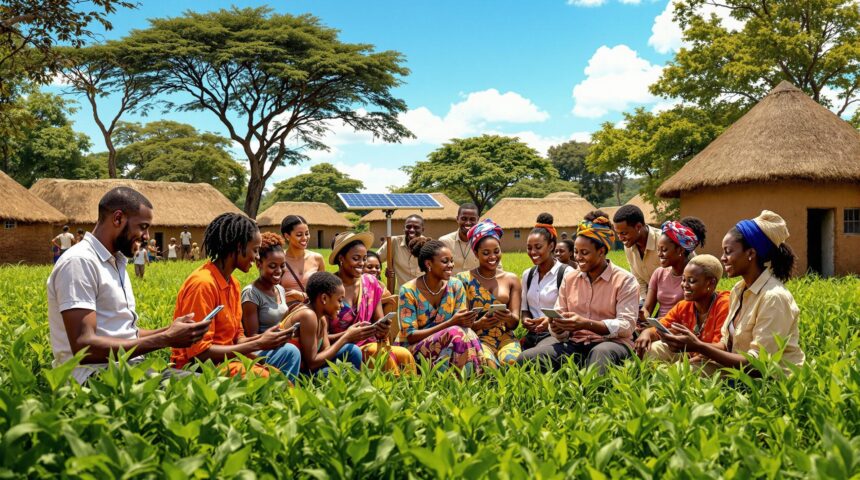One of the key initiatives in Nigeria is the deployment of solar base stations, which provide reliable connectivity in areas without access to traditional infrastructure. Community networks are also being established to ensure that even the most remote villages have access to the internet.
These efforts are not only improving access to essential services but also fostering economic growth in rural communities. By bridging the digital divide, Nigeria is empowering its citizens and creating opportunities for development.
6. Uganda
Uganda is leveraging solar-powered systems and wireless technologies to connect remote areas to the internet. These initiatives are addressing challenges related to limited electricity and difficult terrain, ensuring that even the most isolated communities have access to online resources.
By deploying innovative solutions, Uganda is improving education, healthcare, and economic opportunities in rural regions. These efforts are empowering communities and driving progress in areas that were previously underserved in terms of connectivity.
7. Morocco
Morocco is focusing on addressing geographical barriers to connectivity through government-private partnerships. By tailoring programs to specific regional needs, the country is expanding internet access in areas that were previously underserved.
These initiatives are improving access to essential services and fostering economic development in rural communities. By partnering with local businesses and leveraging advanced technologies, Morocco is making significant strides in bridging the digital divide.
Zenzeleni Project Provides Internet Services to Rural South Africa
The Zenzeleni project in South Africa is a shining example of how public-private partnerships can drive connectivity in rural areas. By providing internet services through solar-powered systems, Zenzeleni is empowering communities and bridging the digital divide.
Through initiatives like Zenzeleni, African countries are demonstrating the power of collaboration between governments and private companies in expanding internet access, improving education and healthcare, and driving economic development in rural areas. These partnerships are paving the way for a more connected and empowered Africa.
In Nigeria, efforts are being made to improve rural internet connectivity, aligning with similar initiatives seen in other countries. However, Nigeria is tailoring its approach to meet the unique needs of its rural areas. Challenges such as maintaining infrastructure across the vast rural landscape and keeping services affordable for low-income communities persist. To address these issues, authorities are looking into long-term investments and community-led solutions to ensure sustainability and affordability.
Uganda has also made strides in improving rural internet connectivity by working closely with national regulators and private companies. Partnerships have expanded network coverage to previously hard-to-reach areas using a mix of fixed-line and wireless technologies. To overcome the challenge of limited electricity in rural areas, solar-powered systems have been introduced, bringing digital access to more people across the country. However, maintaining infrastructure and ensuring reliable service remain ongoing challenges, prompting Uganda to explore new technologies and partnerships to enhance rural connectivity.
Morocco is bridging the digital divide through a collaborative effort between government bodies and private companies. The rural connectivity program, developed through public-private partnerships with major players like Maroc Telecom, is a key example of this initiative. This program takes inspiration from successful African models while addressing Morocco’s specific geographical needs.
New internet technologies are playing a crucial role in boosting connectivity in remote areas where traditional infrastructure faces challenges. Satellite and laser-based solutions, such as Starlink’s low-earth orbit satellites and Google’s Project Taara, are speeding up internet access in these regions.
Despite the tough challenges facing rural internet access in Africa, there are opportunities for growth. New funding models, advanced technologies like low Earth orbit satellites and solar-powered base stations, and policy updates can help address these challenges. Collaborating with local entrepreneurs and community leaders is essential to maintaining connectivity and ensuring that services meet local needs.
To boost rural connectivity, practical and immediate actions can be taken. By integrating satellite broadband with existing land-based networks, improving long-term funding approaches, making policy framework adjustments, and focusing on technology advancements like renewable energy and edge computing, internet access can be expanded across rural Africa. These steps are crucial in ensuring that rural communities have access to affordable and sustainable internet services. The world of technology is constantly evolving, with new advancements and innovations being made every day. One of the most exciting areas of development in recent years has been the rise of artificial intelligence (AI) and machine learning.
AI is the simulation of human intelligence processes by machines, especially computer systems. Machine learning, a subset of AI, is the process by which machines learn from data and improve their performance over time without being explicitly programmed.
These technologies have the potential to revolutionize countless industries, from healthcare to finance to transportation. AI-powered systems can analyze vast amounts of data in a fraction of the time it would take a human, leading to faster and more accurate decision-making.
In healthcare, AI is being used to diagnose diseases, predict patient outcomes, and even assist in surgery. Machine learning algorithms can analyze medical images and identify patterns that may not be visible to the human eye, helping doctors make more accurate diagnoses and treatment plans.
In finance, AI is being used to detect fraud, predict market trends, and personalize customer experiences. Machine learning algorithms can analyze financial data in real-time to identify suspicious transactions and prevent fraudulent activity.
In transportation, AI is being used to improve traffic flow, optimize routes, and enhance safety. Machine learning algorithms can analyze traffic patterns and adjust traffic signals in real-time to reduce congestion and improve the flow of traffic.
While the potential benefits of AI and machine learning are vast, there are also concerns about their impact on jobs and privacy. Some fear that AI-powered systems will replace human workers, leading to job loss and economic instability. Others worry about the potential for AI to invade privacy and misuse personal data.
Despite these concerns, the future of AI and machine learning looks bright. As these technologies continue to evolve and improve, they have the potential to revolutionize the way we live and work. By harnessing the power of AI and machine learning, we can unlock new possibilities and create a more efficient and innovative world.








